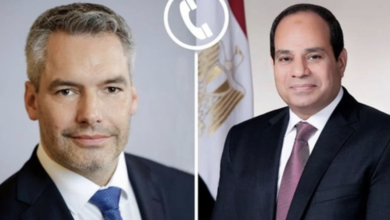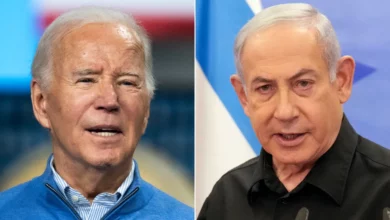
The ongoing conflict in Yemen , which has killed tens of thousands of people and sparked a humanitarian crisis, is among the thorniest issues facing world leaders this week as they meet at the United Nations.
The U.N. envoy saw reason to hope after Yemen’s Houthi rebels announced late Friday that they were halting drone and missile attacks against Saudi Arabia, one week after they claimed responsibility for a strike that crippled a key oil facility in the kingdom.
Saudi Arabia has led a military coalition fighting the Iran-backed Houthis in Yemen since 2015.
U.N. envoy Martin Griffiths called the Houthis’ announcement an opportunity and called for “moving forward with all necessary steps to reduce violence, military escalation and unhelpful rhetoric.”
However, any path toward ending the conflict remains unclear.
A U.N.-mediated cease-fire agreement between Yemen’s government and the rebels last year called for a mutual withdrawal of fighters from the key port of Hodeida, the main entry point for international humanitarian aid to Yemen. But the deal was never fully implemented.
A look at the war, its origins and the devastation it continues to cause:
___
THE CURRENT SITUATION
The country is divided between the Houthi rebels and the Saudi-led, U.S.-backed military coalition that supports the government of Abed Rabbo Mansour Hadi.
The Houthis control the capital of Sanaa and much of northern Yemen. Hadi has been based in the Saudi capital, Riyadh, since 2015, causing some to refer to his administration as the “hotel government.”
Saudi-led airstrikes in Yemen have hit schools, hospitals and wedding parties, and killed thousands of civilians. After nearly four years, the war’s stalemate and the increased Houthi attacks into Saudi territory have cast doubt on the kingdom’s strategy.
___
HOW IT BEGAN
Yemen’s late president, Ali Abdullah Saleh, ruled for more than three decades until a popular uprising that was part of the larger Arab Spring movement forced him to step down in 2012.
He eventually allied himself with the Houthi rebels, whom he had fought in the past, hoping to exploit their strength to return to power. They captured Sanaa in 2014.
As the Houthis and their allies marched south and threatened to take the port city of Aden, Saudi Arabia announced in March 2015 it would lead a coalition of Arab nations to join the conflict. The country has been embroiled in a grinding war since then.
___
THE COST
An estimated 94,000 people have been killed in the conflict, according to the latest data from the Armed Conflict Location & Event Project.
The international nonprofit group Save the Children estimates that 85,000 children under age 5 have died from starvation or disease since the war began.
Some observers have attributed Yemen’s near-famine conditions to the coalition’s blockade of ports that supply Houthi-controlled areas.
Investigations by The Associated Press , however, found that large amounts of food are making it into the country but aren’t getting to those who need it most. The discovery has raised questions about the ability of U.N. agencies and other big aid organizations to operate effectively in Yemen.
Earlier this month, a U.N. report said that all warring parties, including the governments of Yemen, Saudi Arabia, the United Arab Emirates and the Houthis, were possibly implicated in war crimes.
___
A RIFT IN THE COALITION
In July, the UAE, which is the main partner in the Saudi-led coalition, began to reduce its troop levels in Yemen. The Emiratis argued it was time to double down on talks with the Houthis. The move left the coalition with a weakened ground presence and fewer tactical options.
The anti-Houthi bloc was then dealt another blow in August. UAE-backed separatist militias seized Aden, the temporary capital, from forces loyal to Hadi, which are backed by Saudi Arabia.
The fighting between the former allies exposed a potential rift between the Saudis and the Emiratis and threatened to further destabilize the Arab world’s poorest country.
THE ATTACKS IN SAUDI ARABIA
On Sept. 14, the Houthis claimed responsibility for sophisticated drone-and-cruise-missile attacks in the heart of Saudi Arabia’s oil industry.
The strikes cut the kingdom’s oil production by half and caused oil prices to surge by at least 20%, and were by far the most damaging in a series of assaults claimed by the Houthis on the kingdom’s oil infrastructure.
The Saudis claim the attacks were sponsored by Iran. For its part, Iran denies being responsible and has warned any retaliatory attack targeting it will result in an “all-out war.”
On Sept. 20, the Houthis said they were halting all such attacks against Saudi Arabia.
Since then, two more Saudi-led coalition airstrikes in Yemen have killed at least 20 civilians.
By DREW CALLISTER and NOHA ELHENNAWY
FILE – In this Aug. 1, 2019, file photo, Houthi rebels fighters chant slogans as they take off to a battlefront following a gathering aimed at mobilizing more fighters for the Houthi movement, in Sanaa, Yemen. The ongoing conflict in Yemen, which has killed tens of thousands of people and sparked a humanitarian crisis, is among the thorniest issues facing world leaders this week as they meet at the United Nations. (AP Photo/Hani Mohammed, File)




